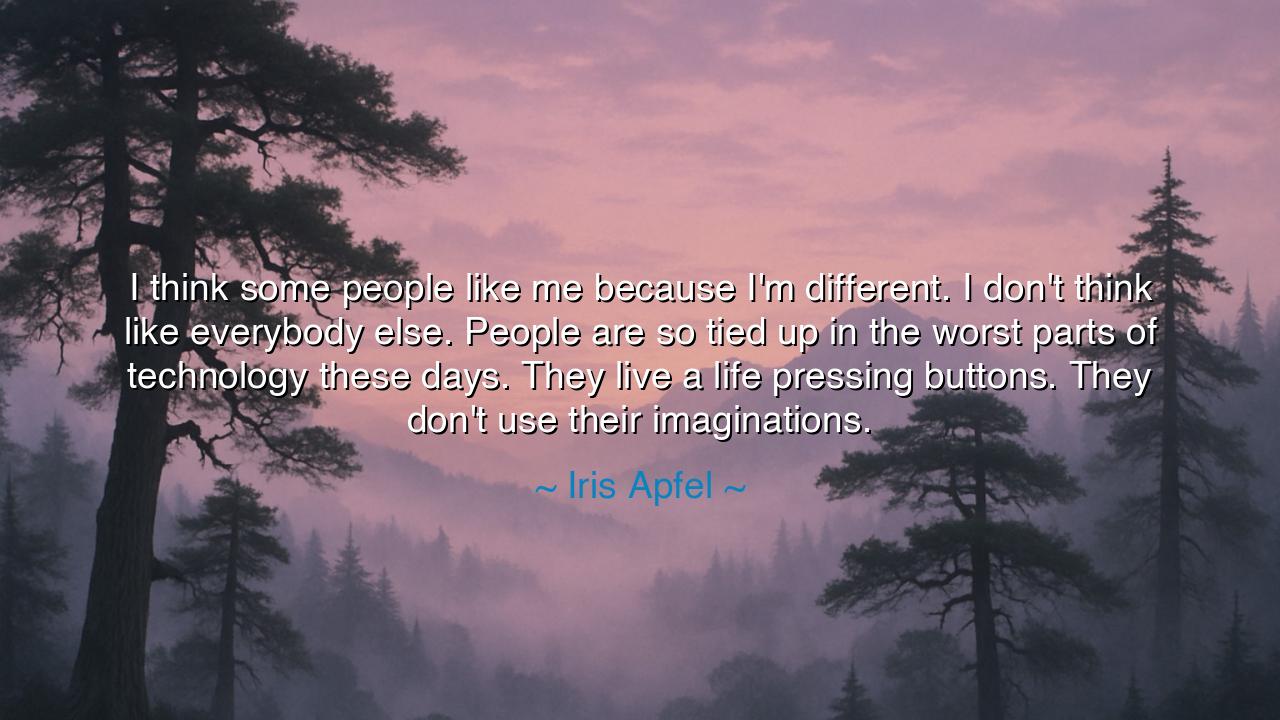
I think some people like me because I'm different. I don't think
I think some people like me because I'm different. I don't think like everybody else. People are so tied up in the worst parts of technology these days. They live a life pressing buttons. They don't use their imaginations.






In the voice of Iris Apfel, the grand dame of style and a woman whose years carved wisdom as much as jewels and fabrics adorned her, we hear a call to individuality and imagination: “I think some people like me because I’m different. I don’t think like everybody else. People are so tied up in the worst parts of technology these days. They live a life pressing buttons. They don’t use their imaginations.” These words, though spoken with her wit and candor, strike like an ancient truth about the soul of humanity, warning of conformity and the dulling of creativity in an age that worships machines.
For what is it to be different? It is to walk against the stream when the world rushes one way. It is to adorn oneself not with sameness, but with uniqueness, not with the stale comforts of imitation, but with the freshness of invention. Apfel recognizes that her strength, her charm, even her fame, is not in blending in but in standing apart. And in her words lies an ancient reminder: that those who dare to be different are the ones remembered, while those who dissolve into the gray mass of conformity are forgotten like dust.
Yet she does not stop at praising individuality—she warns of the snares of technology. For though technology has the power to liberate, too often it chains the mind. The “pressing of buttons” becomes not a tool of freedom but a prison of habit, where lives are reduced to routines dictated by screens, and imaginations—once the wellspring of creation—grow silent. In this, Apfel speaks like the prophets of old, calling her listeners back from the idols of machinery to the treasures of the mind.
History offers us lessons that mirror her words. Recall the story of the Romans, who built vast aqueducts and mechanized war engines, yet when their citizens abandoned imagination for indulgence, the empire fell into decay. Or remember the tale of the Renaissance, when men and women broke free of rigid systems and dared once again to imagine—to paint new worlds, to chart the stars, to compose symphonies. Always, the rise or fall of civilizations has hinged not on their tools alone, but on their ability to use those tools without losing the power of the imagination.
The heart of Apfel’s wisdom is this: it is not technology itself that she condemns, but the enslavement to it. When people forget to imagine, when they live only to react to machines, they forfeit the very gift that makes them human. To think differently, to create beauty, to question, to play, to dream—these are the sparks that advance humanity, not the mechanical repetition of pressing buttons.
Her words carry a lesson of courage and choice. Each of us is offered the temptation of conformity, the ease of following the crowd, the comfort of living within the hum of machines. But Iris Apfel calls us higher: to embrace the imagination, to cultivate uniqueness, to see in ourselves not a cog in the system but a soul with vision. This is the inheritance of artists, leaders, and dreamers in every age, and it is the path to leaving behind something eternal.
So let her words be remembered as a flame passed down: dare to be different, resist the numbing sway of lifeless technology, and above all, awaken your imagination. For it is imagination that paints the future, it is imagination that breaks chains, and it is imagination that crowns the individual with lasting glory. Live not as one who presses buttons without thought, but as one who sees worlds beyond the machine, and in so doing, keeps alive the true greatness of the human spirit.






AAdministratorAdministrator
Welcome, honored guests. Please leave a comment, we will respond soon